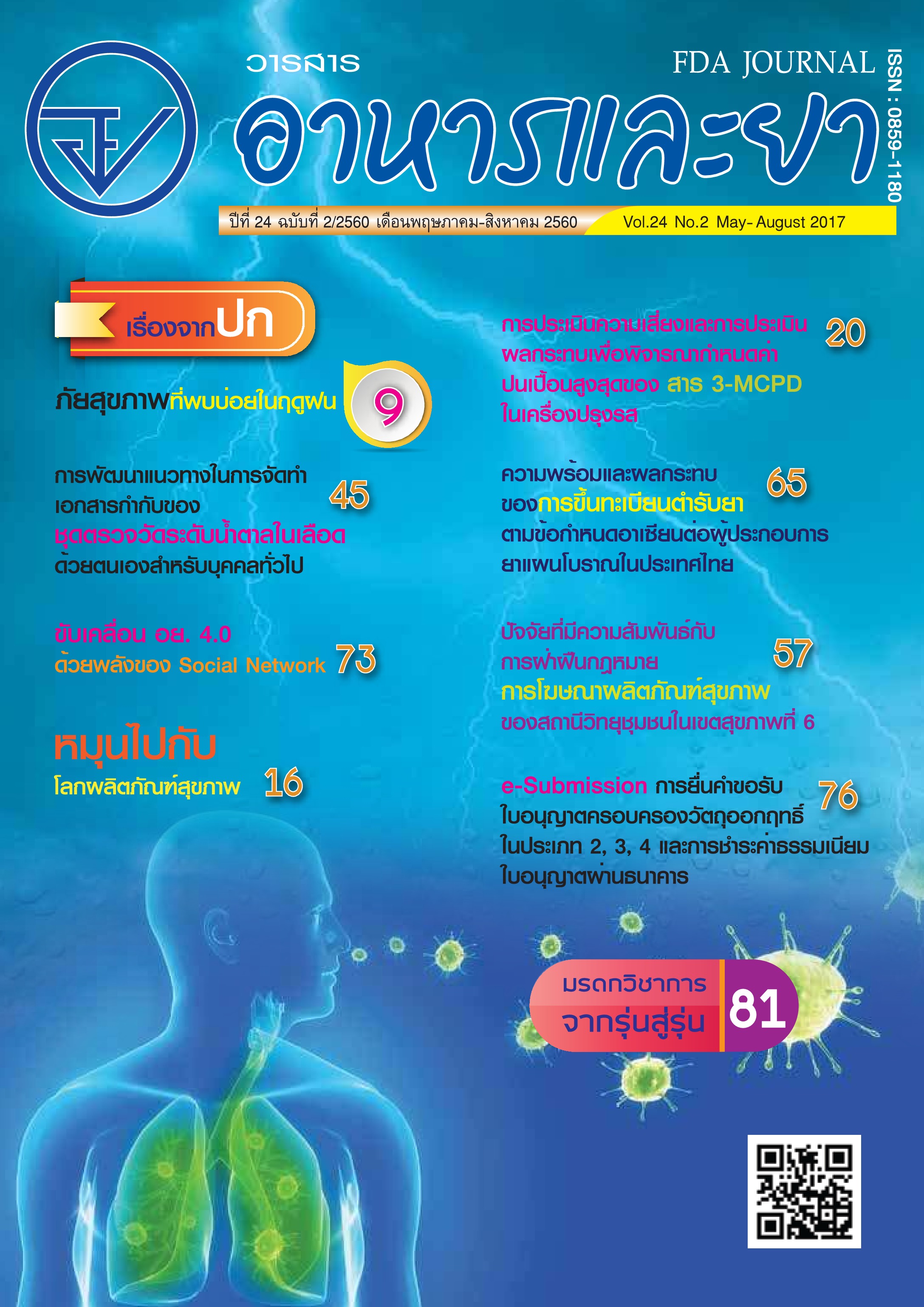ความพร้อมและผลกระทบของการขึ้นทะเบียนตำรับยาตามข้อกำหนดอาเซียน ต่อผู้ประกอบการยาแผนโบราณในประเทศไทย
Main Article Content
บทคัดย่อ
การวิจัยนี้มีวัตถุประสงค์เพื่อสำรวจความพร้อมและผลกระทบต่อผู้ประกอบการยาแผนโบราณในการขออนุญาตขึ้นทะเบียนยาตามข้อกำหนดอาเซียนโดยเก็บข้อมูลในช่วงเดือนพฤศจิกายน 2558 ถึง มกราคม 2559 จากผู้ประกอบการยาแผนโบราณที่ได้รับใบอนุญาตให้ผลิตยาแผนโบราณ จำนวน 269 แห่ง ด้วยแบบสอบถามที่พัฒนาขึ้น การวิเคราะห์ข้อมูลใช้สถิติเชิงพรรณนา โดยใช้สถิติพื้นฐาน ได้แก่ ร้อยละ ค่าเฉลี่ย และส่วนเบี่ยงเบนมาตรฐาน โดยศึกษาถึงความพร้อมในการปฏิบัติตามข้อกำหนดสำหรับการขึ้นทะเบียนตามข้อกำหนดอาเซียน เป็น 3 ด้าน คือ ความพร้อมในการปฏิบัติตามข้อกำหนดด้านคุณภาพและความปลอดภัย ความพร้อมในการปฏิบัติตามข้อกำหนดประสิทธิภาพและการกล่าวอ้างสรรพคุณ และความพร้อมในการปฏิบัติตามข้อกำหนดด้านฉลาก และศึกษาถึงผลกระทบที่คาดว่าจะเกิดขึ้นใน 8 ด้าน คือ ต้นทุน ราคาขาย คุณภาพและความน่าเชื่อถือของผลิตภัณฑ์ จำนวนคำขอขึ้นทะเบียนยาแผนโบราณที่จะนำมายื่นขอขึ้นทะเบียน ระยะเวลาการจัดเตรียมเอกสารเพื่อขึ้นทะเบียน ยอดขายผลิตภัณฑ์ ความสามารถในการแข่งขัน ความสามารถในการส่งออกไปขายต่างประเทศ
ผลการวิจัยได้จากผู้ประกอบการยาแผนโบราณที่ตอบแบบสอบถามทั้งหมด 183 ฉบับ พบว่าภาพรวมความพร้อมของผู้ประกอบการยาแผนโบราณในการขออนุญาตขึ้นทะเบียนตามข้อกำหนดอาเซียน อยู่ในระดับปานกลาง คือ ต้องการเวลาปรับตัวและการอบรม (x̄= 3.02, S.D. = 0.78) ระยะเวลาเฉลี่ย (จำนวนปี) ที่ผู้ประกอบยาแผนโบราณสามารถปฏิบัติได้ตามข้อกำหนดอาเซียน เท่ากับ 5.25 ปี (S.D. = 1.55, max = 10 , min = 1) ในส่วนของผลกระทบที่คาดว่าจะเกิดขึ้นหลังจากปฏิบัติตามข้อกำหนดอาเซียนเมื่อเทียบกับปัจจุบัน ผู้ประกอบการคาดว่าไม่มีผลกระทบต่อจำนวนคำขอขึ้นทะเบียน ระยะเวลาการจัดเตรียมเอกสารเพื่อขึ้นทะเบียน ยอดขายผลิตภัณฑ์ ความสามารถในการแข่งขัน ความสามารถในการส่งออกผลิตภัณฑ์ไปจำหน่ายในต่างประเทศ และคาดว่าจะส่งผลให้ต้นทุน ราคาขาย คุณภาพและความน่าเชื่อถือของผลิตภัณฑ์เพิ่มขึ้น ทั้งนี้ความคิดเห็นของผู้ประกอบการในการขึ้นทะเบียนยาแผนโบราณตามข้อกำหนดอาเซียนเห็นว่าเป็นแนวทางที่มีความน่าสนใจ เนื่องจากเป็นแนวทางในการเพิ่มความเชื่อมั่นในผลิตภัณฑ์ให้กับผู้บริโภค แต่ต้องให้ระยะเวลาในการปรับตัวจึงจะเข้าสู่มาตรฐานได้ ซึ่งผลที่ได้จากงานวิจัยนี้สามารถใช้เป็นข้อมูลในการพิจารณาศักยภาพความพร้อมของผู้ประกอบการ เพื่อหาแนวทางในการพัฒนาการผลิตยาแผนโบราณต่อไป


